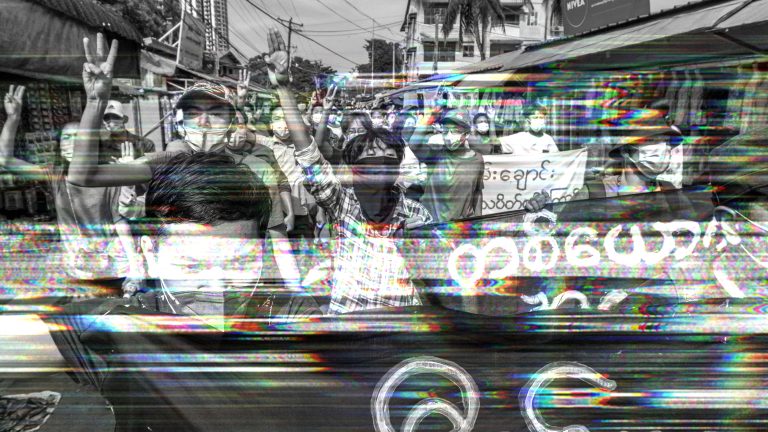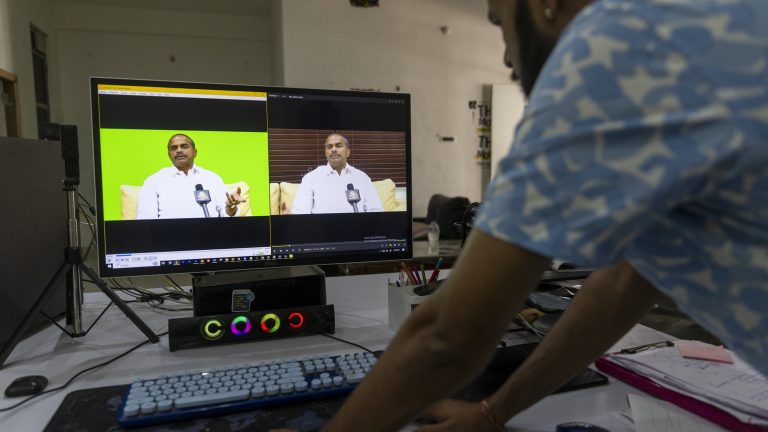When he lost internet access in late September 2021, Salai Kyaw Moe began riding his motorbike from his home in Chin state to a town on the border with the neighboring Magway region, where he could pick up a faint 2G signal.
The Myanmar military shut down the internet hours before it seized power in a military coup in February 2021. Since then, it has routinely disrupted access across the country. In September, the junta blocked access in 25 townships in northwestern and central Myanmar’s Mandalay, Magway, and Sagaing regions and Chin state, which have been strongholds of armed resistance. On March 3, it cut off internet access “indefinitely” across most of the Sagaing region, citing “public security,” according to local media outlet Myanmar Now. The military has also shut down the internet in the jade mining hub of Hpakant, Kachin state, since August, and sporadically blocked services in areas of Myanmar’s southeastern border with Thailand during periods of intense clashes between armed resistance groups and the military.
In many of the same townships where the military has blocked the internet, it has also burned houses, launched airstrikes, and raided villages, displacing tens of thousands of people. The blackouts have disrupted the flow of news and communications that can be vital for people when they are trying to flee to safety, hindered humanitarian organizations’ attempts to respond to crises, and hampered efforts to document human rights abuses and hold the military accountable.
“Some of the most serious [human rights] violations are taking place under the cover of darkness of internet and telecommunications blackouts,” Salai Za Uk Ling, deputy executive director of the Chin Human Rights Organization, an NGO, told Rest of World.
The shutdowns have added to challenges for journalists, including Salai Kyaw Moe, whose name has been changed to protect his identity. “We have to report some news in real time, but we can’t,” he told Rest of World in October 2021. “By the time we arrive in an area with 2G services, the news isn’t relevant or up to date anymore.”
Traveling to get internet access, however, is fraught with danger. At least 120 journalists have been arrested since the coup, and, in December, one died in military custody after being sent to an interrogation center. Soldiers and police commonly stop people on the road, search through their phones and belongings, and detain them. “We travel with the motivation that the people should know what is happening here, so we take the risk,” Salai Kyaw Moe said.
Armed conflict in the wake of the coup has displaced hundreds of thousands of people and devastated livelihoods. But information restrictions have made it hard for food, water, and medicine to reach the places it’s needed, according to relief workers.
“Sometimes, there are injured patients on the ground, but we cannot help them due to delayed information,” said Htun Htun, who leads a volunteer medical network in the Sagaing region, and whose name has been changed to protect his identity. “Sometimes we doubt the news and because we are still verifying it, we are delayed in carrying out our work.” In areas where the military also shut down mobile phone services, his team began relying on human messengers, who have to take considerable risks to travel in conflict zones.
“Some of the most serious [human rights] violations are taking place under the cover of darkness of internet and telecommunications blackouts.”
Thandar Aye, who works with a women-focused civil society organization in Chin state and the Sagaing region, said in October that her group was also relying on human messengers as a last resort and had struggled to deliver humanitarian relief because they couldn’t connect with displaced people in some areas. “We look for the closest local source with whom we can communicate by phone,” she said. “We manage to connect if we’re lucky, and we don’t if we’re not lucky.”
Many people who cannot access the internet are nervous about using voice calls and SMS, due to the military’s heightened surveillance of telecommunications networks. “I worry about whether [the military] is listening in on my phone calls,” said Htun Htun, the medical responder. “We have heavy anxiety about our security in our work. [But] we don’t have many options.”
A spokesperson from the Chin Baptist Convention, which plays an important role in Chin society, including as a humanitarian aid provider and source of information, said in October that he worried about whether accurate information was reaching the people who needed it on time. “We feel we are being blacked out from the news, and, in between, there is misinformation too,” he said. “When we don’t have the internet, which allows one person to share the news for many people to see, we lose contact with many people.”
Sometimes people travel to the nearest spot with internet access so that they can share photos and videos of attacks, Salai Za Uk Ling said. But his organization has lost direct contact with some sources, especially in areas where phone networks are also shut down. “The slowness in the information flow affects our ability to report things in a timely manner,” he added.
Benjamin Strick, investigations director at Myanmar Witness, said his team has faced similar challenges. The nonprofit relies on open-source intelligence techniques, including the use of social media posts, to investigate human rights abuses. Since the coup, it has collected nearly 5,000 pieces of evidence that detail human rights incidents, including explosions, shootings, and detentions, into its database — of which 1,039 have been analyzed and verified.
To verify accounts of violence, Myanmar Witness tries to analyze videos and images from multiple angles and perspectives and piece together a timeline of what happened. Strick said that in areas where the military has shut down the internet, his team simply has less data with which to work, making this task much harder, which in turn makes it difficult to build a case for international judicial processes.
Strick worries that in areas without access to the internet, some incidents may not be documented at all. “There are some things that have slipped under our radar as they happened, that we’ve looked at a month later and said, How did we not see this happen?” he said. “The level of atrocities that have gone unspoken in Myanmar have been quite shocking for us.”



